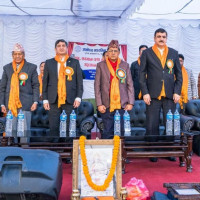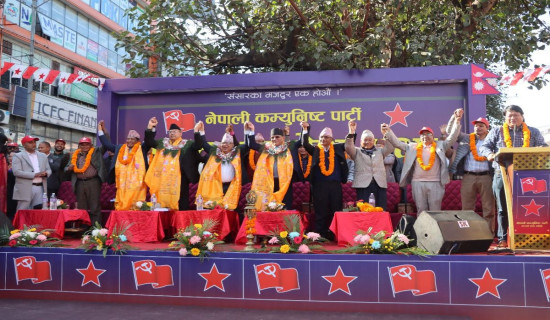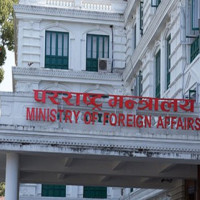- Monday, 1 December 2025
Four provinces announce budget cuts amid austerity initiatives
By Rajani Yogi/ Rammani Dahal/ Nabaraj Kattel/ Laxman Poudel,Surkhet/Hetauda/Biratnagar/ Bhairahawa, Oct. 15: As Nepal's provinces face economic challenges, four major provinces including Karnali, Lumbini, Koshi and Bagmati, have announced significant cuts to their budgets for the current fiscal year. The move is part of a broader strategy to curb unnecessary expenses and ensure more efficient use of resources. These cuts come after the federal government’s decision to downsize the national budget, a decision that has prompted provinces to reassess their financial priorities.
In Karnali Province, government officials are focusing on trimming the budget by approximately 30 per cent. The cuts come in the wake of extensive damage to government property caused during the Gen Z movement on September 8 and 9, which resulted in damages exceeding Rs. 210 million in Surkhet alone.
The Ministry of Economic Affairs and Planning has been tasked with identifying areas to reduce expenditure, including meeting allowances, travel expenses, and vehicle purchases.
Senior Revenue Officer Ganesh Bahadur Chand confirmed that ministries have been asked to submit details on which budget items can be reduced. The provincial government is adopting a cautious approach, following the federal government's own budgetary adjustments.
Chief Minister Yamalal Kandel has directed that cuts be made to non-developmental budget headings while ensuring that critical developmental projects remain intact.
Similarly, in Lumbini Province, Chief Minister Chet Narayan Acharya is taking steps to streamline governance and reduce wasteful expenditure.
The Lumbini Provincial Government is cutting costs by eliminating unnecessary expenses, halting unfeasible projects, and reducing the budget for existing ones by 20 per cent. A key part of the cost-cutting measures is a reduction in the Chief Minister's secretariat, with six advisors and experts being removed from the team. These included political advisor Laxman Gyawali, public relations advisor Dr. Ram Bahadur Raut, and economic expert Ishwori Prasad Aryal, among others.
Chief Minister Acharya explained that these moves aim to improve standard of work while reducing unnecessary financial commitments.
Furthermore, a five-year strategy against corruption has been rolled out, focusing on increasing efficiency and ensuring that projects above NPR 500,000 are executed through open competition. The provincial government has also withdrawn services for former chief ministers and other officials to further cut costs.
In Bagmati Province, where concerns have been raised about the financial burden of maintaining a large provincial structure, the government has also committed to reducing general expenditure.
Provincial Minister for Economic Affairs and Planning Prabhat Tamang stated that the focus would be on cutting back on expenses related to training, seminars, inter-provincial travel, and temporary staffing. He confirmed that the government would save approximately Rs. 70-80 million by reducing these areas.
Additionally, a review of the administrative structure is underway, with plans to reduce the number of ministries from 14 to a more streamlined number.
The cancellation of the Provincial Capital Infrastructure Development Special Project is expected to save an additional Rs. 40 million annually.
The provincial government is also planning to abolish dual-nature offices, unnecessary boards, and councils, further reducing administrative costs.
Minister Tamang emphasized that these steps are crucial for improving fiscal discipline and ensuring that the province's limited resources are used effectively.
While these steps have been welcomed as necessary for improving financial discipline, critics argue that they must go hand in hand with efforts to enhance transparency and governance.
Mahendra Pandey, Chairman of the Transparent Concern Centre in Butwal, noted that while the cost-cutting measures are positive, the government must also focus on increasing efficiency and addressing institutional inefficiencies.
The recent wave of budget cuts in these provinces reflects broader concerns about sustainability of Nepal's federal system and the need for more prudent financial management at all levels of government.
25% budget cut for reconstruction in Koshi
The Koshi Provincial Government has also decided to cut 25 per cent of the budget allocated for the current fiscal year.
The government has made this decision in order to allocate funds for the reconstruction of damages caused by the protests on September 8-9 and the rains, floods, and landslides that occurred from October 3-6.
The Minister for Internal Affairs, Law, and government Spokesperson, Rewati Raman Bhandari, informed that the decision was made to reduce 25 per cent of the total budget for implementation.
“The budget allocated under regular budget headings will now be spent on reconstruction,” Minister Bhandari said.
“We have also opened the way to reallocate funds specifically for post-disaster reconstruction.” During the Gen Z protests, government structures such as the Provincial Assembly and the Chief Minister’s Office in Koshi were damaged.
















